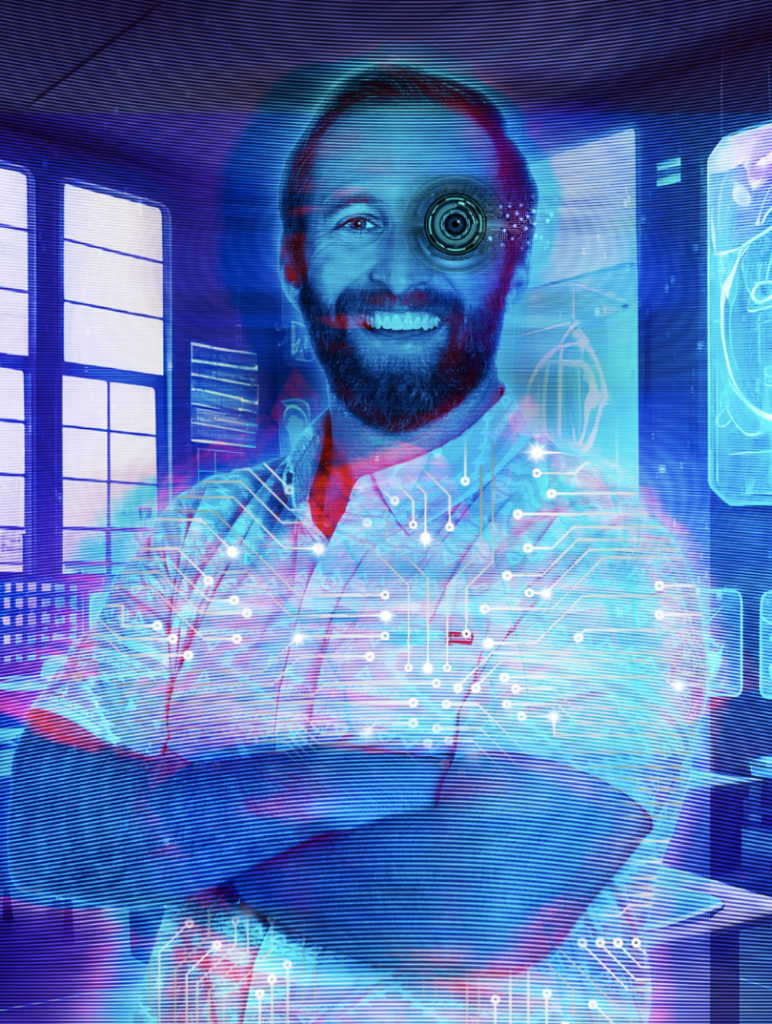
Beata Jones, pictured in an AI-generated setting, has long seen the potential of artificial intelligence. She now integrates the technology into her classroom and helps others do the same. Photo illustrations created by Corrie Buchanan Demmler using portraits by Glen E. Ellman and Adobe Generative Technology
AI in the Classroom
TCU professors are navigating students through the brave new world of artificial intelligence.
After ChatGPT reached 100 million users in just two months following its Nov. 30, 2022, release, Union Bank of Switzerland research confirmed the AI application has one of the fastest growing user bases in internet history. Some TCU professors, while mindful of the technology’s potential consequences, are teaching students how to use generative artificial intelligence — AI tools that create new content — to prepare them for an evolving job market.
“I don’t think anyone really knows what we’re going to be looking at three or four years from now. I know some very smart people are very worried, and that makes me worried,” said Brad Lucas, associate professor of rhetoric and composition. “But we’re definitely going to have to figure out ways to work with the AI products … rather than just pushing them aside.”
LIFELONG LEARNING
Beata Jones, professor of professional practice in information systems and supply chain management, became interested in Eliza, a program that processes natural language, after reading about the technology when she was a teenager. Created by John Weizenbaum, Eliza was one of the original AI chatbots; it emulated a psychotherapist, allowing users to type in questions and responding in a therapeutic manner.
After continuing to follow developments in such technology for four decades, Jones is now integrating AI platforms into her courses and helping others do the same.

Curt Rode, shown in an AI-enhanced portrait, has embraced the technology’s potential benefits. “I originally thought AI was going to make that perpetual struggle with plagiarism much more challenging,” he said, “but that was way before I started playing with it.”
Beginning in spring 2023, Jones required students in her Business Information Systems Development class to sign an ethical agreement verifying that they would not use AI tools to shortcut assignments as they learned Python programming. But later in the semester, Jones gave them free rein with their final project.
“All bets were off. They could use any generative AI tool to help develop the code for the project,” Jones said. “I was comfortable that they knew the basics and allowed them to go anywhere with their project implementation.”
Students primarily used the generative code tool GitHub Copilot to produce code sequences. If they had trouble understanding the code, they then inserted the sequences into ChatGPT, which offered explanations.
Jones said she also uses AI tools for personal tasks such as writing emails or recommendation letters — or generating practice study questions.
“I use it every day,” Jones said, “and it’s most helpful.”
JOINING FORCES
In summer 2023, Jones led a presentation at the Technology in Business Schools Roundtable conference, hosted by TCU, where she taught directors of information technology how faculty can incorporate generative AI tools into their courses. Jones also keeps professors in the Neeley School of Business updated on developments in AI.
Patricia Walters, professor of professional practice in accounting, introduced AI tools into her class projects as a result of Jones’ encouragement.
“She’s effectively the Neeley School guru on AI, and we get at least weekly, if not daily, emails on AI from Dr. Jones,” Walters said.
The Center for Digital Expression, where students, faculty and staff go for help with digital projects, has become a hub of discussion for professors interested in learning more about using AI in the classroom. Jones has collaborated with the center to host discussions on artificial intelligence.
“She’s [Jones] been very good at getting that conversation going and keeping the conversation going with me,” said Curt Rode, senior instructor in poetry and digital humanities and associate director of the center. “The Center for Digital Expression had a roundtable discussion back at the end of March that brought together people from the Koehler Center, fine arts, computational linguistics and then the Center for Digital Expression themselves to talk about what our thoughts and our experiences are with AI in the classroom.”
After experimenting with generative AI tools, Rode began to see the potential benefits the technology could bring to his students’ projects.
“I originally thought AI was going to make that perpetual struggle with plagiarism much more challenging,” Rode said, “but that was way before I started playing with it.”
When Rode determined that his webpage design assignment would better serve students if he taught them to make responsive design, or mobile-first designs that would work as well on mobile devices as desktop ones, he turned to ChatGPT for help.
“It talked me through the basic core concepts and media queries for responsive design,” Rode said. Media queries detect the device that a website is running on, allowing the page to adapt its layout, among other details, to a phone, tablet or computer. “I was able to teach my students a lot more than I had originally planned or was capable of with the assistance of ChatGPT.”
“I was able to teach my students a lot more than I had originally planned or was capable of with the assistance of ChatGPT.”
Curt Rode
In his Digital Culture and Digital Analytics capstone class, a group of students wanted to create a website where users could learn whether the brand of shampoo they use contains toxic ingredients. The students used Python code to develop the tool that lets users enter their shampoo brand into a database and receive a list of toxic ingredients. Rode allowed them to use ChatGPT to help convert the Python code to JavaScript to embed the tool in a user-friendly website.
“They had their own experience, which was using the code that they had written themselves to produce usable JavaScript, which they were able to embed into their website that was then deliverable for the project,” Rode said. “There’s no way I could have possibly helped students develop a web application like that in previous years.
“I think every discipline that requires the internet for information should be acquainted with this tool.”
ADVANCING WRITING AND MEDICINE
Lucas, who teaches technical writing and English composition, believes AI skills should not be excluded from writing classes.
“I don’t see it as something to opt in or out of,” he said. “I think it’s something that’s just coming.”
In his composition classes, Lucas addresses how his students can use ChatGPT to assist in coursework instead of discouraging his class from using the tool altogether. In his Advanced Technical Writing class in spring 2023, he replaced one of his traditional writing assignments with a group project to encourage students to experiment with generative AI tools.

Adam Jennings, reimagined in a futuristic world, uses an AI program that simulates patient interactions as part of students’ clinical training in the Anne Burnett Marion School of Medicine.
Lucas believes other professors should be having similar discussions because of the relevance and progression of AI technology.
“It’s important to make sure the conversations or the thinking doesn’t go in the wrong direction. I know a lot of folks, their initial response was, ‘Well, we have to figure out a way to ban it, to outlaw it, to detect it, to punish,’ ” Lucas said. “And it’s ridiculous because it’s already fully integrated in a lot of our online life and becoming much more public and accessible as a tool.”
Adam Jennings, executive director for simulation education, innovation and research at the Anne Burnett Marion School of Medicine, participated in a panel discussion with Jones on ethical uses of AI for medical students in fall 2023.
One such use is the Oxford Medical Simulation, a new AI technology program that the Burnett School is preparing to introduce into clinical training. Students ask the avatar medical questions, and the technology simulates real patient responses based on Jennings’ data input.
“It allows for a more fluid and realistic patient encounter,” Jennings said, “so I can actually tell what students are learning or not learning.”
Additionally, Jennings encourages his students to use ChatGPT to understand difficult medical concepts and to create personal study guides for exams. He uses the platform to complete personal daily writing tasks, like crafting detailed emails to students.
In fall 2023, the Koehler Center for Instruction, Innovation and Engagement began offering regular Artificial Intelligence Interest Group sessions to help professors learn how to harness its possibilities as a teaching tool. And in spring 2024, Elijah Clark, instructor of marketing, debuted a new class that teaches students to use AI and automation in their marketing efforts
“Everybody can really benefit from using AI,” Jones said. “The future is about integrating AI into our workflows, and those will be the successful employees of the future.”
“I would say most industries in general should be having these conversations, too,” Rode said. “Because if you don’t know how to use it and don’t embrace it, but your competitors do, your competitors now have an edge.”

Your comments are welcome
Comments
Related reading:
Research + Discovery
Digital Safety Net
John T. Harvey recommends creating a Federal Cyber Insurance Corp., which would protect the U.S. from ransomware and other online crimes.
Features
Leveling up
A fintech certificate from the Neeley School of Business positions students at the forefront of economic innovation.
Features
Chief of Change
Grant Moise steers The Dallas Morning News into a new era.